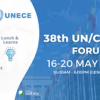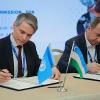News
Displaying Results 76 - 100 of 145
The majority of the ocean’s pollution originates from land-based sources and is washed into the ocean through rivers and other waterways. Turning the tide on marine pollution requires global action, and transboundary cooperation over shared waters forms part of the much-needed solution.
Maritime…
With blockchain opening up many avenues in international trade – from facilitating financing and customs procedures to tracking due diligence and sustainability compliance – countries and companies are looking for successful practices to scale up their efforts to maximize the potential of this new…
July is a month to start enjoying the harvest of fruits and vegetables for many in Europe and the topic of reducing food loss and waste becomes very urgent. In Serbia, agriculture is an important sector of the economy, contributing around 6% of GDP. In March 2022 food production accounted for 10.4…
In view of the upcoming COP 27 of the UNFCCC, taking place in Egypt later this year, the growing threats on climate created by the textile and leather sectors call for our urgent action. If we continue down this path, we will fail by 50% to meet our 2030 emissions reduction targets, resulting in…
Making drinking water and sanitation services affordable for all is key to guaranteeing the human rights to drinking water and sanitation. In the human rights framework, water and sanitation services are unaffordable when paying for them would compromise the ability to pay for other essential needs…
Namibia shares all its perennial rivers with neighboring countries and is both a mid-stream and downstream country. Transboundary water cooperation is therefore crucial for Namibia’s water security and sustainable socio-economic development. In today’s interconnected world, water availability is…
The UNECE region is not on track to meet the Sustainable Development Goals (SDGs) by 2030. Public procurement can be a powerful policy lever to accelerate progress. Some Governments in the UNECE region spend as much as 20 percent of GDP annually on procuring goods, services, and infrastructure.…
The Second High-Level International Conference on the International Decade for Action “Water for Sustainable Development”, 2018-2028, held on 6-9 June 2022 in Dushanbe, Tajikistan, was a strong call for acceleration of efforts on water-related goals and targets of the 2030 Agenda. The meeting…
Adapting to climate change and managing the risks of natural and technological hazards in transboundary basins has become critical, as the frequency and intensity of extreme weather events - such as floods, droughts, landslides or storms - are on the rise in the wake of the changing climate. Timely…
UNECE was engaged at the main global forum to assess and discuss progress in implementing the Sendai Framework for Disaster Risk Reduction (DRR) – the seventh session of the Global Platform for Disaster Risk Reduction (GP2022) held in Bali and online, 25-27 May 2022, fully embracing its theme: “…
Almost all of Zambia’s territory sits within transboundary rivers basins, the Zambezi and Congo River Basins each covering approximately 75% and 25%, respectively, of Zambia’s territorial area.
In this context, Zambia has confirmed its intention to accelerate the accession process to the…
Public-Private Partnerships (PPPs) have become one of the preferred mechanisms for financing the Sustainable Development Goals (SDGs) in many countries in the UNECE region. Through its approach to PPPs for the SDGs, UNECE supports countries identifying, developing and implementing infrastructure…
Embracing sustainable infrastructure that is green, circular, inclusive, resilient, fiscally sustainable, and of high quality is crucial for meeting the Sustainable Development Goals (SDGs). Public-Private Partnerships (PPP) can promote the development of such infrastructure projects by putting…
Recent disruptions of supply chains have exposed fragilities in the current trading system and brought to light the importance of resilience and transparency in global trade.
UNECE and other international organizations play a crucial role in supporting countries (including both the public and…
The textile industry is a key driver of Uzbekistan’s economy, reflected in the country’s rank as sixth largest cotton producer in the world. In 2021, the country accelerated the battle against its child and forced labor violations in cotton harvest according to a new International Labour…
Infrastructure investment is long-term in nature and can lay the foundations for sustainable development in member States. To improve the sustainability of infrastructure and public services, such investments must be aligned with the Sustainable Development Goals (SDGs) says the United Nations…
As supply chains within the garment and footwear sector are becoming increasingly complex, the need for transparency is more relevant than ever. Consumers, investors and shareholders are pressing for transparent business activities as well as the prevention and mitigation of risks in value chains,…
“There is a not a single major global challenge that does not involve water. This includes migration, conflict, disease, hunger, gender equity, population growth, urbanization, and climate change”. These were the words of UN-Water Chair, Mr. Gilbert Houngbo, as governments and key stakeholders from…
There is overwhelming evidence that we need robust management and traceability for the sustainable and circular supply and use of climate-critical raw materials. Calls are increasing for the production of raw materials to embrace circularity. Demand for batteries and other low carbon technologies…
Global trade has been transformed repeatedly throughout history, driven by new business processes and new policies. The new advances in digitalization now promise further transformation by making it faster, more transparent, reducing risks of red tape and corruption. With the increase in global…
Over 60 participants worldwide joined the online roundtable organized by the UN Digital transformation group for Europe and Central Asia (DTG4ECA) in the framework of the Regional Forum on Sustainable Development for the UNECE region. Established in May 2020, DTG4ECA group, co-chaired by UNECE and…
Minerals such as lithium, cobalt, and copper are essential for digitalization, for renewable energy technologies, and for the further deployment of electric vehicles. Demand for these and other minerals – known as “critical raw materials” (CRMs) – is growing fast as governments and businesses act…
Strengthening value chains between Africa and the European Union (EU) is a priority objective for sustainable growth and decent jobs across the two continents. Recent market imbalances and disparities, involving supply chain disruptions and lack of attention to the social and environmental impacts…
A variety of European and African representatives from business, science, and government presented initiatives to raise awareness of universal sustainable resource management systems at the EU-Africa Business Forum. Experts called for further integration of European and African value chains through…
Today marks the holding of the first meeting of the Working Group on Tailings Safety and the Prevention of Accidental Water Pollution (IIWG) in Kazakhstan – the first comprehensive dialogue on these issues between all relevant stakeholders and national authorities in the country.
After being…

























